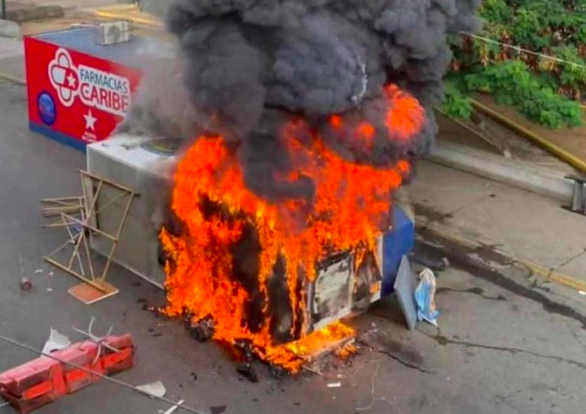By Ricardo Vaz for Venezuelanalysis
Venezuela’s post-electoral scene has been marked by anti-government mobilizations and confrontations with security corps.
The unrest has followed the July 28 presidential elections that saw incumbent Nicolás Maduro secure a third term while the hardline opposition refused to accept the results.
Since late Sunday, there have been multiple reports of street barricades in different cities, with burnt tires or other debris used to block major roads and highways. Transit between Caracas and the country’s main airport in La Guaira was interrupted on Monday morning.
In the early afternoon, a group of protesters attempted to advance to Miraflores Presidential Palace through the central Urdaneta Avenue before being stopped by a police cordon. Social media videos showed armed civilians appearing to fire live rounds at the opposition crowd to disperse it.
Other social media footage showed protesters with weapons as well as attacking bystanders or security officers.
Later in the afternoon, another group of masked activists clashed with the National Guard in El Silencio, close to another access to the presidential palace. A large pro-opposition contingent likewise attempted to march from Eastern Caracas but was stopped by police cordons and eventually dispersed.
Social media users reported on mobilizations in a number of Venezuelan cities as well. A mob in the Lara state town of Jiménez set the local city hall on fire on Monday evening. There were unconfirmed reports of three people dead and more than forty wounded. For his part, Defense Minister Vladimir Padrino spoke of 23 wounded servicemen and called on the Venezuelan people to remain calm.
Venezuelan President Nicolás Maduro, who was officially proclaimed as the winner of Sunday’s presidential vote earlier in the day, condemned the violence in a televised broadcast.
“There have been dozens of arrests,” he said. “More than 80 percent of those detained had criminal records, many of them had recently returned to the country.” The Venezuelan president dismissed the idea that the demonstrations were spontaneous and pointed the finger at far-right Vente Venezuela, the organization led by María Corina Machado.
Maduro said the Attorney General’s Office was investigating the intellectual authors and financiers behind the public unrest. He went on to list the damage done to public property across the country, including the destruction of two statues of former President Hugo Chávez.
The Venezuelan president warned that the far-right is engaged in a coup attempt and trying to recreate the violent “guarimba” protests that rocked the South American nation in 2014 and 2017, leaving dozens dead. Maduro and other high-ranking Chavista figures called on government supporters to take to the streets on Tuesday afternoon in a march for peace and against fascism.
The tense atmosphere has followed Sunday’s presidential vote that saw Venezuela’s National Electoral Council (CNE) declare Maduro the winner with 51.2 percent of the vote, compared to 44.2 percent for hardline opposition candidate Edmundo González.
CNE President Elvis Amoroso stated that the results were irreversible with 80 percent of voting centers tallied and 59 percent turnout registered. CNE authorities also informed that an attack against the electoral infrastructure had delayed the final computation and publishing of results.
Venezuelan Attorney General Tarek William Saab stated that investigations yielded that the electronic sabotage came from Northern Macedonia and was tied to Lester Toledo, an opposition figure currently abroad fleeing charges.
For its part, the US-backed opposition has maintained its refusal to recognize the electoral results. On Sunday night, Machado, who has led the anti-government’s camp’s actions, proclaimed González as Venezuela’s president-elect.
On Monday, Machado gave a press conference where she claimed the González campaign had possession of 73 percent of the tallies from voting centers and that the results yielded an overwhelming victory for the opposition candidate with a nearly 30-point lead over Maduro.
Machado and González pledged to publish their results in an online database that could be sorted by state, municipality and voting center, but the page was not working at the time of writing. The hardline opposition called for mobilizations on Tuesday morning.
Venezuela’s post-election scene also saw Caracas engaged in a diplomatic standoff with other regional governments.
On Monday afternoon, the Venezuelan Foreign Ministry announced it was withdrawing its diplomatic personnel from Argentina, Chile, Costa Rica, Panama, Peru and the Dominican Republic, pointing at “statements and actions meddling in internal Venezuelan affairs.” The statement additionally accused the seven governments of being “subordinated to Washington.”
Venezuelan authorities went on to temporarily suspend air travel connecting Caracas to Panama City and Santo Domingo beginning on Wednesday.

